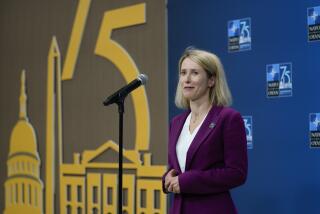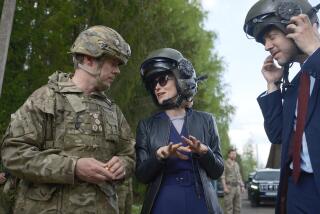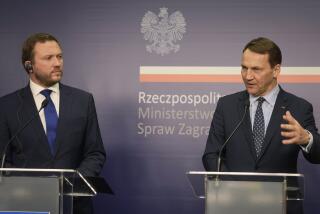Smiles Sparkle in Estonia as Word Spreads
- Share via
TALLINN, Estonia — Big smiles lit up Estonian faces Monday evening as the news spread that the United States had recognized their tiny republic’s independence, but any dancing in the streets, they said, will be reserved for the day that the Soviet Union acknowledges its sovereignty.
“There is a very joyful mood in Estonia because we are closer than ever to becoming independent,” said Tiina-Mari Nummert, an 18-year-old art student who was sketching a street scene in Tallinn’s old town when she heard the news.
“The Soviet Union is close to recognizing our independence, too. And when it does, the people will come out into the streets and there will be a party everywhere.”
President Bush telephoned the leaders of each of the three Baltic republics--Lithuania, Latvia and Estonia--to tell them that the United States was ready to “immediately” restore diplomatic relations with them. Although the United States had never officially acknowledged the Soviet Union’s annexation of the Baltic states in 1940, Bush had tried to give Soviet President Mikhail S. Gorbachev a chance to recognize Baltic independence first.
Estonian President Arnold Ruutel said he greeted the news with “great happiness,” not only because it showed America’s support for the Baltic countries, but also because the United States is in a unique position to influence the Soviet Union to make a similar declaration.
“This will help the deputies at the Congress and the Soviet president to understand that they must recognize our statehood,” Ruutel said in an interview.
Ruutel made it clear that renewed diplomatic relations with the United States rank in a class of their own.
“The recognitions by big European governments are very important to us because we want to integrate with the economic and political life of Europe,” he said. “But recognition by the United States is different because it plays the leading role in world politics.”
In neighboring Latvia, President Anatolijs Gorbunovs applauded Bush’s decision. “We are especially glad that the United States has now taken that step,” he told reporters. “This makes our independence irreversible.”
Tens of thousands of Lithuanians had celebrated U.S. recognition in advance, pouring into the central square of their capital, Vilnius, late Sunday, after word reached the republic that Bush would make his announcement Monday.
“We have won! The victory is here!” Lithuanian Defense Minister Audrius Butkevicius told the roaring crowd.
Each of the republics had already declared its independence and established working nationalist governments.
Although Ruutel predicted that “without a doubt” the United States’ decision would hasten a positive Soviet response, some Estonians still worried that the Kremlin would use its troops stationed in the republic against the people.
“We do not know what Moscow will do,” said Leliti Kaup, 59, who has spent all but the first eight years of her life in a country dominated by its giant neighbor. “We are afraid. How Moscow acts is most important. Only when Moscow lets us go can we live without worries.”
Juri Teras, a 23-year-old medical student who was lounging in the bright sun on a church lawn, agreed: “It makes us feel good to know that big countries care about little Estonia. But until the Soviet Union sanctions our independence and pulls out its Red Army we will not be free.”
A steady stream of nations have acknowledged the independence of the three Baltic republics since the failure of the Kremlin putsch two weeks ago. At last count, 50 countries had informed Estonia’s Foreign Ministry of their intentions to establish diplomatic relations.
Many people in all three Baltic republics had been disappointed that the United States had not taken an earlier stand.
Monday afternoon, a saleswomen in the Baltica men’s store in Tallinn perked up as a radio reporter pronounced Bush’s name, but there was nothing in the report about Bush’s pronouncement on the Baltics. “It looks really strange that the rest of the world has acknowledged us and the United States--the great defender of freedom--does not seem to want to,” said Lea Preimut, 44.
An hour later, however, after hearing the news of U.S. recognition, Preimut said with a smile: “Now that is more like it. Maybe Bush will give us some economic assistance as well.”
Elmar Geine, 42, office manager for the Estonian Popular Front, the spearhead of the republic’s independence movement, said he thought it was perfectly normal for the United States to set its own schedule.
“The United States plays such a dominant role in world politics that its decisions have global implications,” Geine said. “It is not important who said what first. What is important is that the American government never recognized our occupiers as the legitimate government. This was a huge moral support for us and a stimulus for our independence drive.”
Estonia’s economics minister, Jaak Leimann, saluted Bush’s timing.
“Maybe it is good that they came to the solution today, because it is a good way to influence the Moscow Congress,” Leimann said, referring to the Congress of Peoples’ Deputies meeting in the Soviet capital. “Because they must decide on our future.”
While Ruutel and many other Estonians praised America for its support during the intense drive for independence in the Baltics during the past three years, some people said they felt the United States had been too worried about harming its relations with Moscow to actively assist Baltic nationalist movements.
“The United States always seemed to be more on Moscow’s side,” said Nummert, the art student, as she sat on the curb of a steep cobblestone road surrounded by Old World architecture.
“During our decades under Soviet rule, the United States was passive,” Rein Tiik, 35, a construction engineer said. “Only recently has it started to support us slightly.”
Tiik said that with or without the United States--or the Soviet Union for that matter--Estonia would stay the course.
“It will be easier, of course, if we get confirmation from President Gorbachev on our independence, but nothing terrible will happen if we don’t,” he continued. “We chose our path long ago.”
More to Read
Sign up for Essential California
The most important California stories and recommendations in your inbox every morning.
You may occasionally receive promotional content from the Los Angeles Times.













